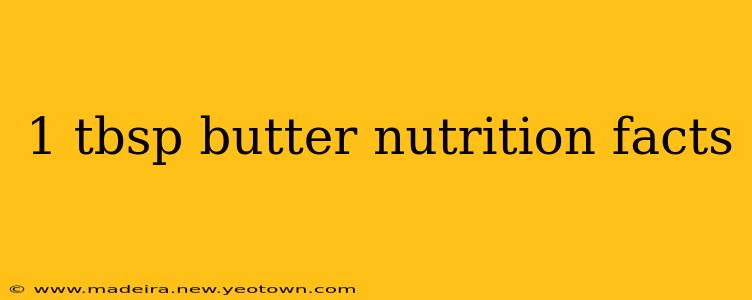One Tablespoon of Butter: A Nutritional Deep Dive
Butter, that golden delight spread on toast or melting into popcorn, is a staple in many kitchens. But how much do we really know about the nutritional content packed into just one tablespoon? Let's unpack the facts, exploring not just the basics, but also addressing some common questions and concerns.
This isn't just a simple recounting of numbers; it's a story about the often-misunderstood nature of fats, and how a small amount of butter can fit into a balanced diet. We'll look beyond the calories and explore the role of saturated fat, the presence of vitamins, and the potential health implications. This journey will answer common questions that many people have about this seemingly simple ingredient.
What are the basic nutritional facts for 1 tablespoon of butter?
A single tablespoon (approximately 14 grams) of unsalted butter typically contains roughly:
- Calories: Around 100-102
- Total Fat: Approximately 11.5 grams
- Saturated Fat: Roughly 7 grams
- Cholesterol: About 30mg
- Sodium: Minimal to none (in unsalted butter)
It's important to note that these values can vary slightly depending on the brand and type of butter (e.g., salted vs. unsalted, grass-fed vs. conventionally raised cows). Always check the nutrition label on your specific product for the most accurate information.
Is the saturated fat in butter unhealthy?
This is a common question and a point of much debate. For years, saturated fat has been vilified as a major contributor to heart disease. However, current research paints a more nuanced picture. While excessive saturated fat intake is indeed linked to increased cholesterol levels, the impact on heart health is more complex and depends on various individual factors, including overall diet and lifestyle.
Moderation is key. One tablespoon of butter isn't likely to significantly impact your health, especially if it's part of a balanced diet rich in fruits, vegetables, and whole grains. However, consistently consuming large amounts of saturated fat is still something to be mindful of.
What vitamins and minerals are in butter?
While butter isn't a powerhouse of vitamins and minerals, it does offer small amounts of fat-soluble vitamins like Vitamin A and Vitamin E. The amount varies depending on the diet of the cow, with grass-fed butter generally containing higher levels of these vitamins.
Is butter high in cholesterol?
Yes, one tablespoon of butter contains a moderate amount of cholesterol. However, dietary cholesterol's effect on blood cholesterol levels is less significant than previously believed. Your body produces its own cholesterol, and the cholesterol you consume through food has a less dramatic impact than previously thought. Still, those with high cholesterol should monitor their butter intake as part of a broader cholesterol-management plan.
Are there healthier alternatives to butter?
Absolutely! Many healthier alternatives exist, depending on your culinary needs. Olive oil offers heart-healthy monounsaturated fats, while avocado oil boasts a high smoke point ideal for cooking. Nut butters provide additional nutrients and fiber, though they're higher in calories. The best alternative for you will depend on the specific application and your individual dietary preferences and health goals.
Ultimately, the key is moderation and balance. Enjoying a tablespoon of butter occasionally as part of a well-rounded diet isn't something to overly worry about. But understanding its nutritional profile allows for informed choices and helps you make healthier decisions overall. Remember to always consult with a healthcare professional or registered dietitian for personalized dietary advice.

